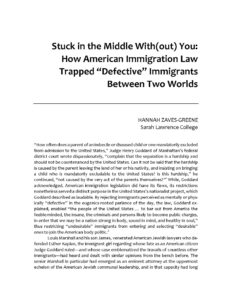Journal article:
Stuck in the Middle With(out) You: How American Immigration Law Trapped “Defective” Immigrants Between Two Worlds
 Journal of Transnational American Studies: Volume 14, Number 2 – November 2023
Journal of Transnational American Studies: Volume 14, Number 2 – November 2023
The idea that at the beginning of the twentieth century, both political rhetoric and legal definition distinguished between immigrants who were “desirable” and those who were not, also looms large in Hannah Zaves-Greene’s essay… Zaves-Greene investigates one particular concept which was used to bar immigration, that of “public charge.” This idea held some immigrants were liable to become a “burden to the state,” and should hence be denied access to the US nation-state. Zaves-Greene follows one particular case in which the notion of “public charge” was applied to keep a young Jewish woman, Esther Kaplan, from becoming American. Having been classified as “mentally deficient,” Esther was seen as an “undesirable immigrant.” This charge was quickly challenged by Jewish American lawyers who sought to intervene into both the classification and the logic on which it was premised. Zaves-Greene thus weaves together concepts of early twentieth-century eugenics, disability, and immigration to show how the transnational and the medical were intimately connected. (Excerpted from introduction to special issue: Diagnosing Migrant Experience: Medical Humanities and Transnational American Studies)
Chapter in edited volume:
The Right to Choose: The Public Health and Birth Control Movements of Lillian Wald and Margaret Sanger
 Forged in America: How Irish-Jewish Encounters Shaped a Nation, Nov. 2023
Forged in America: How Irish-Jewish Encounters Shaped a Nation, Nov. 2023
The story of America is the story of the unlikely groups of immigrants brought together by their shared outsider status. Urban American life took much of its shape from the arrival of Irish and Jewish immigrants in the nineteenth and twentieth centuries, and Forged in America is the story of how Irish America and Jewish America collided, cooperated, and collaborated in the cities where they made their homes, all the while shaping American identity and nationhood as we know it.
Bringing together leading scholars in their fields, this volume sheds light on the underexplored histories of Irish and Jewish collaboration. While mutual antagonism was clearly evident, so too were opportunities for cooperation, as settled Irish immigrants served to model, mentor, and mediate for Jewish newcomers. Together, the chapters in this volume draw fascinating portraits that show mutuality in action and demonstrate its cultural reverberations. (From publisher’s description)
Journal article:
The Cost of Labor: Lillian Wald, Maternal Health, and the Politics of Birth Control

American Jewish History: Volume 104, Number 4 – October 2020
Hannah Greene demonstrates how Wald’s middle-class Jewish background informed her advocacy for birth control and determined the rhetorical strategies she used to fight for its legality. When Wald argued that women needed contraceptives in order to become better mothers, she drew upon the maternalist sensibilities that offered Jewish women a path to respectability within the larger, Christian-dominated women’s movements of the early twentieth century. Wald harnessed these same maternalist principles to justify women’s involvement in an array of social welfare projects, as well as her own personal rejection of nuclear domesticity in favor of passionate same-sex relationships with other social reformers. (Excerpted from introduction to special issue: Sexuality in American Jewish History)
Magazine:
Who May Come to America?: Integrating Disability into Jewish Studies
 AJS Perspectives: Fall 2019 – “The Body Issue”
AJS Perspectives: Fall 2019 – “The Body Issue”
“Who May Come to America?: Integrating Disability into Jewish Studies”
Ada Lieb’s physical and mental disabilities almost forced her to leave the United States. Her family migrated from Russia to Nashville in 1922, where Ada found employment as a milliner thanks to her talent for needlework. Upon developing anxiety, numbness in one leg, and tremors in one hand resulting from childhood trauma, she transitioned to retail—until her employer fired her because of her shyness and limited English. Joblessness triggered “a sort of melancholia,” in which Ada stopped speaking and refused food. After a doctor insisted that Ada’s “physical disability was only a child of her mind,” she nearly found herself an inmate of a public mental institution. Fortuitously, a caseworker from the National Council of Jewish Women intervened.
